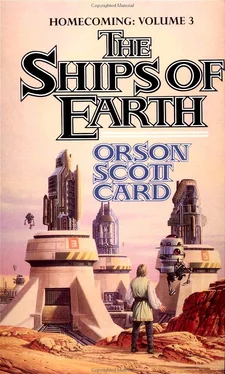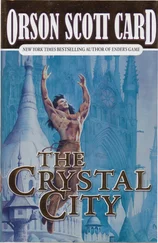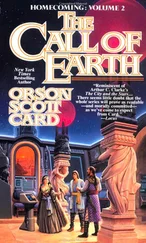Orson Card - THE SHIPS OF EARTH
Здесь есть возможность читать онлайн «Orson Card - THE SHIPS OF EARTH» весь текст электронной книги совершенно бесплатно (целиком полную версию без сокращений). В некоторых случаях можно слушать аудио, скачать через торрент в формате fb2 и присутствует краткое содержание. Жанр: Фантастика и фэнтези, на английском языке. Описание произведения, (предисловие) а так же отзывы посетителей доступны на портале библиотеки ЛибКат.
- Название:THE SHIPS OF EARTH
- Автор:
- Жанр:
- Год:неизвестен
- ISBN:нет данных
- Рейтинг книги:4 / 5. Голосов: 1
-
Избранное:Добавить в избранное
- Отзывы:
-
Ваша оценка:
- 80
- 1
- 2
- 3
- 4
- 5
THE SHIPS OF EARTH: краткое содержание, описание и аннотация
Предлагаем к чтению аннотацию, описание, краткое содержание или предисловие (зависит от того, что написал сам автор книги «THE SHIPS OF EARTH»). Если вы не нашли необходимую информацию о книге — напишите в комментариях, мы постараемся отыскать её.
THE SHIPS OF EARTH — читать онлайн бесплатно полную книгу (весь текст) целиком
Ниже представлен текст книги, разбитый по страницам. Система сохранения места последней прочитанной страницы, позволяет с удобством читать онлайн бесплатно книгу «THE SHIPS OF EARTH», без необходимости каждый раз заново искать на чём Вы остановились. Поставьте закладку, и сможете в любой момент перейти на страницу, на которой закончили чтение.
Интервал:
Закладка:
"But we brought back two deers," said Obring happily.
With everyone reunited, Volemak made a little speech establishing this place as their campsite. "The river to the north we will name Oykib, for the firstborn boy of this expedition, and the river to the south is Protchnu, for the firstborn boy of the next generation."
Rasa was outraged. "Why not name them Dza and Chveya, for the first two children born on our journey?"
Volemak looked at her steadily without answering.
"Then we had better leave this place before the boys are old enough to know how you have honored them solely because they have penises."
"If we had had only two girls, and two rivers, Father would have named the rivers for them," said Issib, trying to make peace.
They knew it wasn't true, of course. For several weeks after they got there, Rasa insisted on calling them the North River and the South River; Volemak was just as adamant in calling them the River Oykib and the River Protchnu. But since it was the men who did more traveling, and therefore crossed the rivers more often, and fished in them, and had to tell each other about places and events up and down the rivers' lengths, it was the names Oykib and Protchnu that stayed. Whether anyone else noticed or not, however, Luet saw that Rasa never used Volemak's names for the rivers, and grew silent and cold whenever others spoke their names.
Only once did Nafai and Luet discuss the matter. Nafai was singularly unsympathetic. "Rasa didn't mind when women decided everything in Basilica, and men weren't even allowed to look at the lakes."
"That was a holy place for women. The only place like it in the world."
"What does it matter?" said Nafai. "It's just a couple of names for a couple of rivers. When we leave here, no one else will ever remember what we named them."
"So why not North River and South River?"
"It's only a problem because Mother made it a problem," said Nafai. "Now let's not make it a problem between us."
"I just want to know why you go along with it!"
Nafai sighed. "Think, for just a moment, what it would mean if I had called them the North and South rivers. What it would have meant to Father. And to the other men. Then it really would have been divisive. I don't need anything more to separate me from the others."
Luet chewed on that idea for a while.
"All right," she said. "I can see that."
And then, after she had thought a little more, she said, "But you didn't see anything wrong with naming the rivers after the boys until Mother pointed it out, did you?"
He didn't answer.
"In fact, you really don't see anything wrong with it now, do you?"
"I love you," said Nafai.
"That's not an answer," she said.
"I think it is," he said.
"And what if I never give you a son?" she said.
"Then I will keep making love to you until we have a hundred daughters," said Nafai.
"In your dreams," she said nastily.
"In yours, you mean," he said.
She made the deliberate decision not to stay angry with him for this, and as they made love she was as willing and passionate as ever. But afterward, when he was asleep, it worried her. What would it mean to them for the men to make their company as male-dominated as Basilica had been female-dominated?
Why must we do this? she wondered. We had a chance to make our society different from the rest of the world. Balanced and fair, even-handed, right. And yet even Nafai and Issib seem content to unbalance it. Is the rivalry between men and women such that one must always be in ascendancy at the expense of the other? Is it built into our genes? Must the community always be ruled by one sex or the other?
Maybe so, she thought. Maybe we're like the baboons. When we're stable and civilized, the women decide things, establish the households, the connections between them, create the neighborhoods and the friendships. But when we're nomadic, living lives on the edge of survival, the men rule, and brook no interference from the women. Perhaps that's what civilization means—is the dominance of the female over the male. And wherever that lapses, we call the result uncivilized, barbarian…manly.
They spent a year between the rivers, waiting for Shedemei's baby to be born. It was a son; they named him Padarok— gift —and called him Rokya. They might have moved on then, after the first year, but by the time little Rokya was born, three of the other women had conceived—including Rasa and Luet, who were the most fragile during pregnancy. So they stayed for a second harvest, and a few months more, until all the women but Sevet had completed their pregnancy and borne a child. So there were thirty of them that began the next stage of the journey, and the first generation of children were walking and most of them beginning to talk before they were on their way.
It had been a good two years. Instead of desert farming, they had lush, rain-watered fields on good soil. Their crops were more varied; the hunting was better; and even the camels thrived, giving birth to fifteen new beasts of burden. Making saddles was harder—none of them had ever learned the skill—but they found a way to put two toddlers on each of the four most docile animals, which always traveled in train with the women's camels. When the children first tried out the saddles, some of them were terrified—camels ride so high above the ground—but soon enough they were used to it, and even enjoyed it.
The journey was easy through the savanna along the seacoast; they ate up the kilometers as they never had before, even on the smooth desert west and south of Basilica. In three days they reached a well-watered bay that the men were already familiar with, having hunted and fished there during the past two years. But in the morning, Volemak dismayed them all by telling them that their course now lay, not south as they had all expected, but west.
West! Into the sea!
Volemak pointed at the rocky island that rose out of the sea not two kilometers away. "Beyond it is another island, a huge island. We have as long a journey on that island as we have had since we left the Valley of Mebbekew."
At low tide, Nafai and Elemak tried fording the strait between the mainland and the island. They could do it, with only a short swim in the middle. But the camels balked, and so they ended up building rafts. "I've done it before," said Elemak. "Never for a saltwater crossing, of course, but the water here is placid enough."
So they felled trees and floated the logs in the bay, binding them together with ropes made of the fibers of marsh reeds. It took a week to make the rafts, and two days to take the camels across—one at a time—and then the cargo, and then, last of all, the women and children. They camped on the shore where they had landed, as the men poled the rafts around the island to the southwestern tip, where again they would need the rafts to ferry everyone and everything to the large island. In another week the company had traversed the small island and crossed to the large one; they pushed the rafts into the water and watched them float away.
The northern tip of the large island was mountainous and heavily forested. But gradually the mountains gave way to hills, and then to broad savannas. They could stand at the crest of the low rolling plain and see the Scour Sea to the west and the Sea of Fire to the east, the island was so narrow here. And the farther south they went, the more they understood how the Sea of Fire earned its name. Volcanos rose out of the sea, and in the distance they could see the smoke of a minor eruption from time to time. "This island was part of the mainland until five million years ago," Issib explained to them. "Until then, the Valley of Fires came right down onto this island, south of us—and the fires still continue in the sea that has filled the space between the two parts of the valley."
Читать дальшеИнтервал:
Закладка:
Похожие книги на «THE SHIPS OF EARTH»
Представляем Вашему вниманию похожие книги на «THE SHIPS OF EARTH» списком для выбора. Мы отобрали схожую по названию и смыслу литературу в надежде предоставить читателям больше вариантов отыскать новые, интересные, ещё непрочитанные произведения.
Обсуждение, отзывы о книге «THE SHIPS OF EARTH» и просто собственные мнения читателей. Оставьте ваши комментарии, напишите, что Вы думаете о произведении, его смысле или главных героях. Укажите что конкретно понравилось, а что нет, и почему Вы так считаете.









